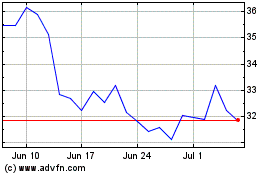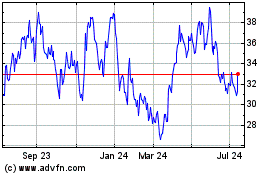U.S. Stocks Open Lower Amid Trade Woes
August 12 2019 - 10:08AM
Dow Jones News
By Avantika Chilkoti and Akane Otani
U.S. stocks fell Monday, following global markets lower, as a
slide in bond yields pulled bank stocks lower.
The Dow Jones Industrial Average lost 176 points, or 0.7%, to
26111 shortly after the opening bell. The S&P 500 declined 0.5%
and the Nasdaq Composite fell 0.6%.
Worries about the path of U.S.-China trade negotiations and the
global economy have kept stocks and bond yields under pressure for
much of the month. Goldman Sachs analysts said Monday that the
outlook for trade talks had "collapsed," adding that they believe
Washington and Beijing won't reach an agreement before the 2020
elections.
Few analysts believe the U.S. is headed toward an imminent
downturn.
"Given the low unemployment and strong consumer confidence in
the U.S., it's unlikely we get a recession any time soon," said
Patrick Spencer, managing director at U.S. investment firm
Baird.
But others worry that the gloomy outlook reflected in bond
markets -- where yields across the globe have dropped in recent
months -- could soon be reflected in stocks too.
"If [yields] keep edging down, the equity market is clearly
wrong because the bond market will be telling you we have one
mother of a recession coming," said Neil Dwane, global strategist
at Allianz Global Investors.
Bank stocks took a fresh hit Monday as U.S. Treasury yields
retreated again, with Citigroup and Morgan Stanley each losing more
than 1%. Declining bond yields tend to weigh on banks by cutting
into their lending profitability.
Tyson Foods slipped 2.1% after saying it would have to rebuild a
beef plant in Kansas that was partially destroyed by a fire.
Elsewhere, the Stoxx Europe 600 edged down 0.2%, weighed down by
declines among lenders and travel and leisure stocks.
Among the biggest gainers in the region was Tullow Oil, whose
shares rose 18% after the company said it had found more oil off
the coast of Guyana.
Hong Kong's Hang Seng Index fell 0.4% after protests at the
city's airport prompted authorities to cancel more than 100
flights. Chinese authorities said the violent weekend
demonstrations marked the emergence of " the first signs of
terrorism" in the semiautonomous city, and vowed a merciless
crackdown.
"Hong Kong is clearly an important bellwether for just how far
China is willing to exert its influence," said Matthew Cairns, a
senior rates strategist at Rabobank.
"This is a clear show of Chinese strength and I don't think,
just as we are seeing in the trade war, that China will be willing
to allow overt breaches of its authority within the region and that
clearly is having pretty negative effect in terms of the Hang
Seng," he added.
The Shanghai Composite closed higher, though, notching a 1.5%
gain after China's central bank continued to weaken the yuan,
though at a slower pace than traders had expected. That helped ease
concerns of a sharp devaluation after President Trump last week
accused China of manipulating its currency.
--William Horner, Steven Russolillo and Frances Yoon contributed
to this article.
Write to Avantika Chilkoti at Avantika.Chilkoti@wsj.com and
Akane Otani at akane.otani@wsj.com
(END) Dow Jones Newswires
August 12, 2019 09:53 ET (13:53 GMT)
Copyright (c) 2019 Dow Jones & Company, Inc.
Tullow Oil (LSE:TLW)
Historical Stock Chart
From Mar 2024 to Apr 2024

Tullow Oil (LSE:TLW)
Historical Stock Chart
From Apr 2023 to Apr 2024
